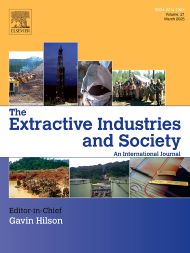Conceptual framework to assist in the decision-making process when planning for post-mining land-uses
To avoid a climate crisis, major industrial economies are being urged to reduce their dependence on coal-fired power generation. Given decarbonisation pressures, many coal mining regions worldwide are facing the prospect of mine closures. However, few viable planning mechanisms are available to assess potential post-mining alternatives and enhance regional transition. To optimise transition outcomes and maximise stakeholder acceptance, mechanisms that incorporate input from a diverse range of stakeholders and disciplinary perspectives are needed at a regional scale. These mechanisms need to compute seemingly disparate types of multi-disciplinary and multi-scale data in a robust, coherent, and transparent fashion. This paper presents a conceptual mixed-method framework for post-mining land-use planning that integrates stakeholders’ involvement, GIS, multi-criteria decision-making and fuzzy logic. The framework utilise environmental and socio-technical data to support the decision-making process. This work is driven by the urgency to offer mining regions in transition a tool for planning their post-mining future. The proposed framework builds on previous literature and has the ability to support a wide variety of institutions and professionals in their efforts to facilitate the post-mining planning process in mining-dependent regions toward a low-carbon future.
Language: English
Publisher: The Extractive Industries and Society
Region: Australia
Type: Article
CITATION
Arratia-Solar, A., Svobodova, K., Lèbre, É., Owen, J.R. (2022). Conceptual framework to assist in the decision-making process when planning for post-mining land-uses. Sustainable Minerals Institute, The University of Queensland: Brisbane, Australia.

